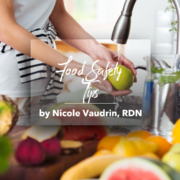Food Safety Education Month
By Brandon Bolton, RDN
September is Food Safety Education Month. It is a time to bring awareness to food safety and to learn more about foodborne illnesses (also known as food poisoning). There are steps that we can all take to help keep food safe and prevent food poisoning.
“An estimated 48 million Americans get sick from food poisoning every year.”
Centers for Disease and Control
Common symptoms of food poisoning include, but are not limited to:
- an upset stomach
- stomach cramps
- nausea
- vomiting
- fever
- dehydration
Food poisoning can lead to hospitalization, and some groups of people are even more likely to get sick from eating unsafe food. These groups include adults aged 65 and older, young children under 5 years old, people with pre-existing health conditions, and pregnant women. While these groups may be at higher risk of getting sick, food safety is important for everyone!
The CDC recommends following these four steps when you prepare and handle your food:
- Clean – Wash hands, surfaces, utensils, and equipment that you use to cook. Wash your hands often, especially before you prepare and eat foods, for at least 20 seconds with soap and water.
- Separate – Raw meat, poultry, seafood, and eggs should be separated from your cooked foods and fresh produce. Be sure to use different cutting boards, knives, and utensils when working with and preparing raw foods and fresh produce. This can help prevent cross-contamination. These foods should also be stored separately in the refrigerator, with raw meats being stored on the bottom shelf.
- Cook – Use a food thermometer to make sure you are cooking your foods to the proper internal temperature, which will kill harmful germs and bacteria. To see the appropriate minimum cooking temperatures, look at these food safety charts.
- Chill – Refrigerate perishable foods and leftovers within two hours. If food is exposed to temperatures greater than 90 degrees, it should be refrigerated within one hour.
Following these four steps can help protect you and your family from foodborne illness. You can also visit the Centers for Disease Control and Prevention for more information, and don’t forget to reach out to your NOAH dietitians with any questions regarding food safety!






